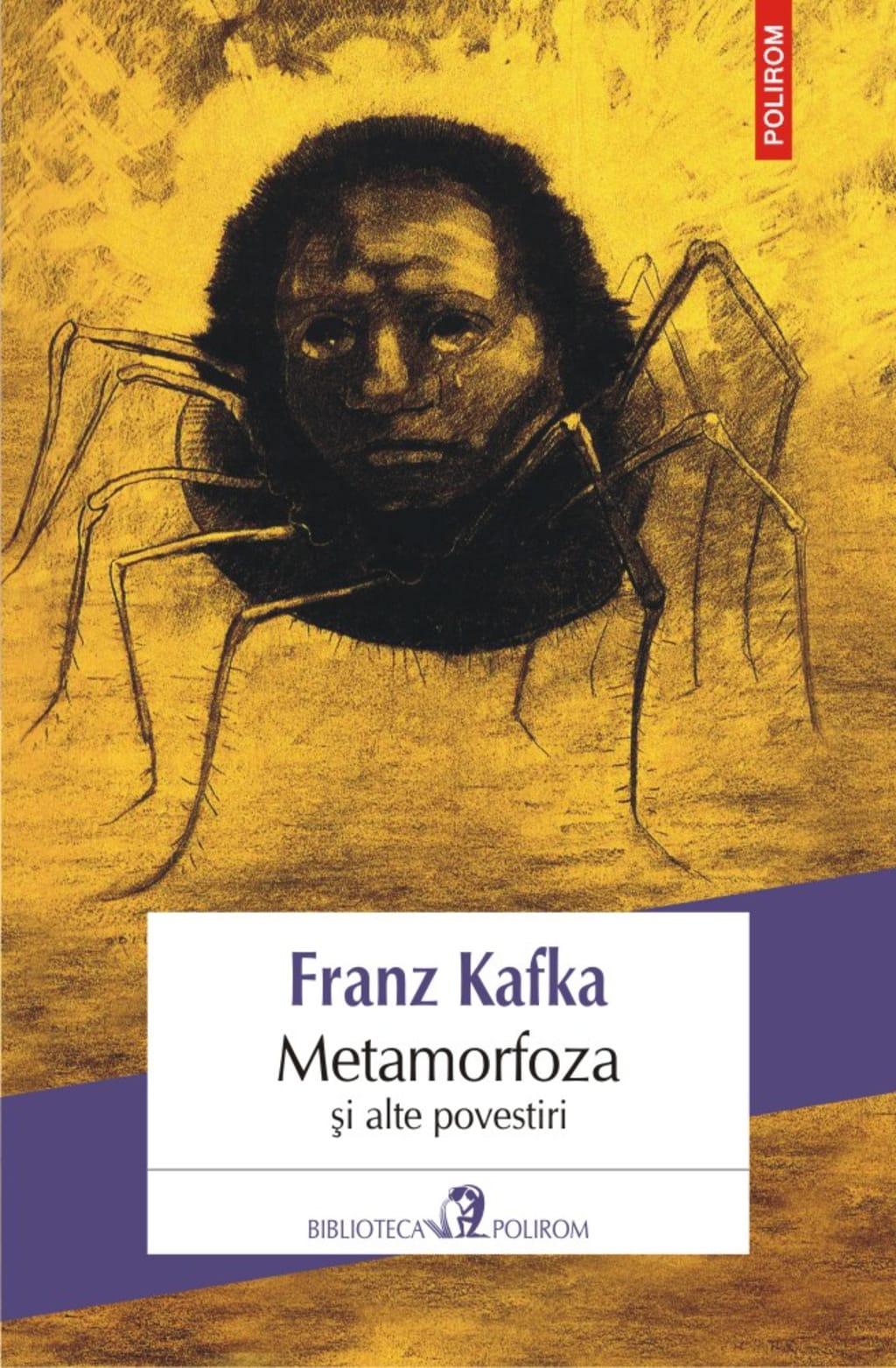The Metamorphosis
This article is about the literary work by Franz Kafka. For the biological process, see Metamorphosis. For other uses, see Metamorphosis (disambiguation).

Metamorphosis (German: Die Verwandlung) is an allegorical novella written by Franz Kafka which was first published in 1915. One of Kafka's best-known works, Metamorphosis tells the story of salesman Gregor Samsa, who wakes one morning to find himself inexplicably transformed into a huge insect (ungeheueres Ungeziefer, lit. "monstrous vermin") and subsequently struggles to adjust to this new condition. The novella has been widely discussed among literary critics, with differing interpretations being offered. In popular culture and adaptations of the novella, the insect is commonly depicted as a cockroach.Plot
Gregor Samsa wakes up one morning to find himself transformed into a "monstrous vermin". He initially considers the transformation to be temporary and slowly ponders the consequences of this metamorphosis. Stuck on his back and unable to get up and leave the bed, Gregor reflects on his job as a traveling salesman and cloth merchant, which he characterizes as being full of "temporary and constantly changing human relationships, which never come from the heart". He sees his employer as a despot and would quickly quit his job if he were not his family's sole breadwinner and working off his bankrupt father's debts. While trying to move Gregor finds that his office manager, the chief clerk, has shown up to check on him, indignant about Gregor's unexcused absence. Gregor attempts to communicate with both the manager and his family, but all they can hear from behind the door is incomprehensible vocalizations. Gregor laboriously drags himself across the floor and opens the door. The clerk, upon seeing the transformed Gregor, flees the apartment. Gregor's family is horrified, and his father drives him back into his room, injuring his side by shoving him when he gets stuck in the doorway.
With Gregor's unexpected transformation, his family is deprived of financial stability. They keep Gregor locked in his room, and he begins to accept his new identity and adapt to his new body. His sister Grete is the only one willing to bring him food, which they find Gregor only likes if it is rotten. He spends much of his time crawling around on the floor, walls, and ceiling and, upon discovering Gregor's new pastime, Grete decides to remove his furniture to give him more space. She and her mother begin to empty the room of everything except the sofa Gregor hides under whenever anyone comes in, but he finds their actions deeply distressing. He desperately tries to save a particularly loved portrait on the wall of a woman clad in fur. His mother loses consciousness at the sight of him clinging to the image to protect it. When Grete rushes out of the room to get some aromatic spirits, Gregor follows her and is slightly hurt when she drops a medicine bottle and it breaks. Their father returns home and angrily hurls apples at Gregor, one of which becomes lodged in a sensitive spot in his back and severely wounds him.
Gregor suffers from his injuries for several weeks and takes very little food. His father, mother, and sister all get jobs and increasingly begin to neglect him, and his room begins to be used for storage. For a time, his family leaves Gregor's door open in the evenings so he can listen to them talk to each other, but this happens less frequently once they rent a room in the apartment to three male tenants, since they are not told about Gregor. One day the charwoman, who briefly looks in on Gregor each day when she arrives and before she leaves, neglects to close his door fully. Attracted by Grete's violin-playing in the living room, Gregor crawls out and is spotted by the unsuspecting tenants, who complain about the apartment's unhygienic conditions and say they are leaving, will not pay anything for the time they have already stayed, and may take legal action. Grete, who has tired of taking care of Gregor and realizes the burden his existence puts on each member of the family, tells her parents they must get rid of "it" or they will all be ruined. Gregor, understanding that he is no longer wanted, laboriously makes his way back to his room and dies of starvation before sunrise. His body is discovered by the charwoman, who alerts his family and then disposes of the corpse. The relieved and optimistic father, mother, and sister all take the day off work. They travel by tram into the countryside and make plans to move to a smaller apartment to save money. During the short trip, Mr. and Mrs. Samsa realize that, despite the hardships that have brought some paleness to her face, Grete has grown up into a pretty young lady with a good figure and they think about finding her a husband.
Characters
Gregor Samsa
"Gregor Samsa" redirects here. For other uses, see Gregor Samsa (disambiguation).
Gregor is the main character of the story. He works as a traveling salesman in order to provide money for his sister and parents. He wakes up one morning finding himself transformed into an insect. After the metamorphosis, Gregor becomes unable to work and is confined to his room for most of the remainder of the story. This prompts his family to begin working once again. Gregor is depicted as isolated from society and often both misunderstands the true intentions of others and is misunderstood.
The name "Gregor Samsa" appears to derive partly from literary works Kafka had read. A character in The Story of Young Renate Fuchs, by German novelist Jakob Wassermann (1873–1934), is named Gregor Samassa.[1] The Viennese author Leopold von Sacher-Masoch, whose sexual imagination gave rise to the idea of masochism, is also an influence. Sacher-Masoch wrote Venus in Furs (1870), a novel whose hero assumes the name Gregor at one point. A "Venus in furs" recurs in The Metamorphosis in the picture that Gregor Samsa has hung on his bedroom wall.[2]
Grete Samsa
Grete is Gregor's younger sister, and she becomes his caretaker after his metamorphosis. They initially have a close relationship, but this quickly fades. At first, she volunteers to feed him and clean his room, but she grows increasingly impatient with the burden and begins to leave his room in disarray out of spite. Her initial decision to take care of Gregor may have come from a desire to contribute and be useful to the family, since she becomes angry and upset when the mother cleans his room. It is made clear that Grete is disgusted by Gregor, as she always opens the window upon entering his room to keep from feeling nauseous and leaves without doing anything if Gregor is in plain sight. She plays the violin and dreams of going to the conservatory to study, a dream Gregor had intended to make happen; he had planned on making the announcement on Christmas Day. To help provide an income for the family after Gregor's transformation, she starts working as a salesgirl. Grete is also the first to suggest getting rid of Gregor, which causes Gregor to plan his own death. At the end of the story, Grete's parents realize that she has become beautiful and full-figured and decide to consider finding her a husband.[3]
Mr Samsa
Mr Samsa is Gregor's father. After the metamorphosis, he is forced to return to work in order to support the family financially. His attitude towards his son is harsh. He regards the transformed Gregor with disgust and possibly even fear and attacks Gregor on several occasions. Even when Gregor was human, Mr Samsa regarded him mostly as a source of income for the family. Gregor's relationship with his father is modelled after Kafka's own relationship with his father. The theme of alienation becomes quite evident here.[4]
Mrs Samsa
Mrs Samsa is Gregor's mother. She is portrayed as a submissive wife. She suffers from asthma, which is a constant source of concern for Gregor. She is initially shocked at Gregor's transformation, but she still wants to enter his room. However, it proves too much for her and gives rise to a conflict between her maternal impulse and sympathy and her fear and revulsion at Gregor's new form.[5]
The Charwoman
The charwoman is an old widowed lady who is employed by the Samsa family after their previous maid begs to be dismissed on account of the fright she experiences owing to Gregor's new form. She is paid to take care of their household duties. Apart from Grete and her father, the charwoman is the only person who is in close contact with Gregor, and she is unafraid in her dealings with Gregor. She does not question his changed state; she seemingly accepts it as a normal part of his existence. She is the one who notices Gregor has died and disposes of his body.
About the Creator
Rebecca Maria
Hi! My name is Rebecca and I'm good at black and white drawing. On this site I will write interesting things and things that some of you do not know. I hope you enjoy You can write me in the comments what would interest you.Thank you .






Comments
There are no comments for this story
Be the first to respond and start the conversation.